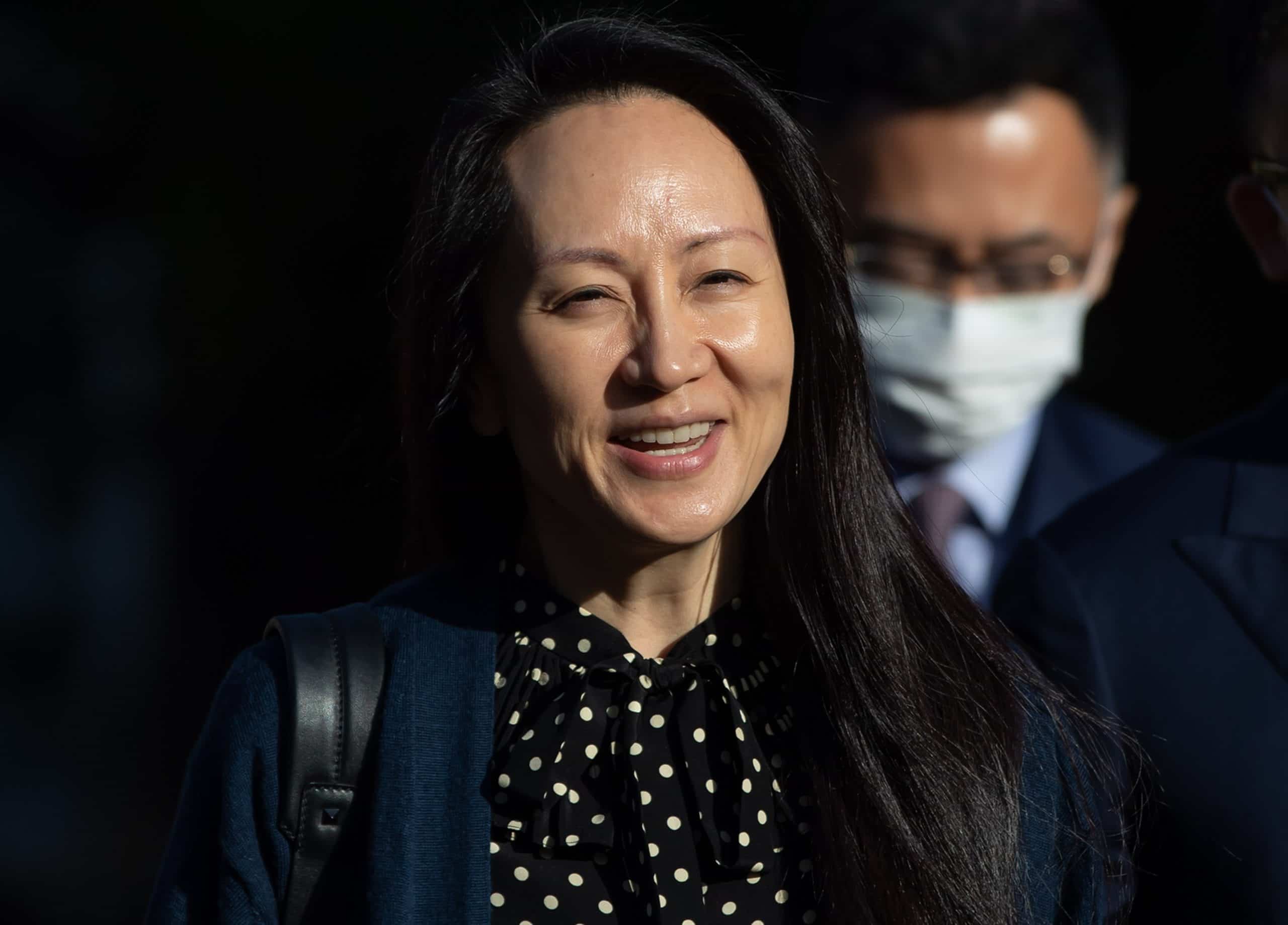Canada can bring the 2 Michaels home after U.S. drops Meng Wanzhou extradition
Published September 24, 2021 at 9:46 pm

Meng Wanzhou walked out of a British Columbia Supreme Court Friday free from a 34-month legal saga after a judge agreed to a discharge order that withdrew a U.S. extradition request against her.
Associate Chief Justice Heather Holmes signed the order discharging Meng from the extradition proceeding, vacating her vacating bail conditions and officially closing the Canadian case against her.
“You have been cooperative and courteous throughout the proceedings and the court appreciates and thanks you for that,” Holmes told Meng.
“Thank you, my lady,” Meng answered.
Meng’s lawyers and supporters hugged and applauded as she left the courtroom.
In a statement outside the court, she thanked the judge, the Crown lawyers and the Canadian people for their tolerance.
“Sorry for the inconvenience,” she said.
Meng also noted how her life has been turned “upside down” by the case. She appreciates the court for their professionalism and the Canadian government for upholding the rule of law, she said.
“It was a disruptive time for me as a mother, a wife and a company executive,” Meng said.
“But I believe every cloud has a silver lining. It really was an invaluable experience in my life. The greater the difficulty, the greater the growth.”
The discharge order follows a virtual appearance by Meng in a New York courtroom Friday where she pleaded not guilty to all charges where the judge signed off on a deferred prosecution.
The Huawei executive was originally detained in Vancouver in December 2018 at the behest of the U.S., where a 13-count grand jury indictment accused the company and Meng, the daughter of the company’s founder Ren Zhengfei, of misrepresenting their ownership of Hong Kong-based subsidiary Skycom between 2007 and 2017 in order to circumvent American sanctions on Iran.
Meng, who appeared in the New York court via video link, answered most of Judge Ann Donnelly’s questions with simple yes and no answers, all with the help of a court-appointed translator.
For the record, Donnelly read out the four charges Meng was facing: bank fraud, wire fraud, conspiracy to commit bank fraud and conspiracy to commit wire fraud, all of them linked to allegations of violating U.S. sanctions on Iran.
The judge signed off on a personal recognizance bond that grants Meng’s freedom, subject to certain conditions. The bond does not include a reporting requirement and most of the conditions apply only in the United States.
“Ms. Meng, how do you plead to the charges — guilty or not guilty?” she asked.
“Not guilty,” Meng replied through her interpreter.
Assistant U.S. attorney David Kessler told court the agreement would allow for the charges against Meng to be dismissed after Dec. 1, 2022 — four years from the date of her arrest — provided that she “complies with all her obligations” under the terms of the deal.
The U.S. statement spells out the thrust of the allegations against Meng — essentially, that she portrayed Skycom, a Hong Kong company that operated primarily in Iran, as a separate and distinct business partner when it was for all intents and purposes a wholly owned subsidiary.
“As Meng knew, Skycom was not a business partner of, or a third party working with, Huawei,” the document says. “Instead, Huawei controlled Skycom, and Skycom employees were really Huawei employees.”
Donnelly repeatedly asked Meng if she had read and absorbed the terms of the agreement, including an attached statement of facts, and had carefully vetted its contents with her lawyers.
“Are you entering into this agreement voluntarily and of your own free will?” the judge continued. “Yes,” came the reply.
Huawei and Skycom were also charged with bank fraud, wire fraud, conspiracy and violating the U.S. International Emergency Economic Powers Act — the sanctions law. The status of those charges remains unclear.
A statement from Canada’s Department of Justice said the United States has withdrawn the request to extradite Meng, and there is no longer a basis for the extradition proceedings against her.
“Meng Wanzhou is free to leave Canada,” the statement said. “Meng Wanzhou was afforded a fair process before the courts in accordance with Canadian law. This speaks to the independence of Canada’s judicial system.”
The Huawei executive’s arrest three years ago saw relations between Canada and China deteriorate and a cascade of effects including the arrest of two Canadian citizens, Michael Kovrig and Michael Spavor. China though has publicly maintained that there is no connection between her case and the men’s imprisonment but has also dropped broad hints that if she were allowed to go free, that could benefit the two Canadians.
The agreement could prove a critical step in Canada’s efforts to secure the release of Kovrig and Spavor.
Kovrig is a Canadian diplomat on leave to the International Crisis Group, a peace-building non-governmental organization. Spavor is an entrepreneur who tried to forge people and business ties to North Korea. They were detained on Dec. 10, 2018.
Earlier this year, Kovrig and Spavor were both convicted of spying in closed Chinese courts — a process that Canada and dozens of allies say amounts to arbitrary detention on bogus charges in a closed system of justice with no accountability.
China disputes the criticism, accusing Canada of being a lapdog of the U.S. and has repeatedly demanded Meng’s immediate release. China says the U.S. is simply trying to prevent Huawei from asserting its dominance in the international telecommunications market.
Spavor received an 11-year sentence, which has fuelled speculation that he could be simply deported by China. Kovrig has yet to be sentenced.
— Hina Alam and James McCarten, The Canadian Press
insauga's Editorial Standards and Policies advertising





